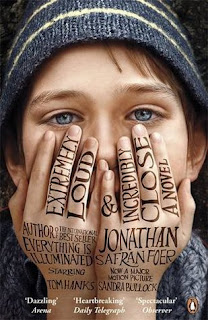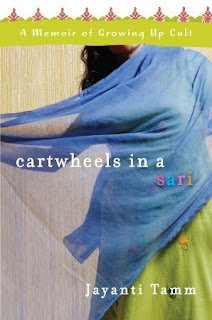Jonathan Safran Foer has written a novel which is very ambitious. The novel deals with loss, mourning, healing, relationships, and all the messy complications that come from being human. It is touching and at times, even profound. I greatly enjoyed the character of Oskar. I thought he hit all the right notes and it was a wonderful treatment of loss following 9/11, which is perhaps, a tricky thing to convey. I loved the unusual use of odd text and random photos throughout the book to help lend context and to help us get inside the head of the characters. The characters are rich and wholly formed, it is difficult to think that they don't exist in real life. Excellent.
Joan Didion is quite possibly one of our greatest living writers. There are two things I absolutely loved about this book - the treatment of the subject matter, and her stunningly brilliant writing. First the subject: Few people have tackled the idea of grief, and to some extent marriage itself, with the absolute truth and insight that Didion does here. You not only understand Joan's grief, you feel it in your very bones. The reading of this book probably provides more insight into the process than anything that has been heretofore written on the subject. The second subject, Didion's writing: Brilliant. She's a genius. Who else writes so crisply, so succinctly and yet, manages to convey so much depth? Who else manages to pull the exactly perfect word into a sentence, a word you might not have even thought about for a long time, and yet there it is, the perfect word conjured up to give the precise meaning needed? I cannot give this book enough praise.
This kind of worked it's way into my psyche and truly made a little dent in the way I think, observe the world, process things. Her ruminations are lovely. It's a quick read if you want to read it all at once. But it can also be a slow read if you want to savor it in little bits. Now that I've read it I will probably go back and read it again. There are great insights here. Her thinking is circular and tangential. But that's kind of the point. It's a meditative book meant to give you new ways of looking at your world.
Price knows how to write a good who-dun-it. But Price also knows how to write some lovely prose - "a clear winter's night, the sky still holding on to that last tinge of electric blue. Directly above their heads, sneaker-fruit and snagged plastic bags dangled from bare tree limbs; above that, an enricling ring of fourteen-story buildings; hundreds of aluminum framed eyes twitching TV light silver, and above all, the stars, faintly panting, like dogs at rest." Have you read a better description of inner city beauty? I could quibble with a few of the plot twists in the book, but I won't, because somehow, in the end, it all works.
Though a slim volume of what amounts to 3 long short stories, I really adored these descriptive & contemplative little jewels. Ogawa is able to convey a tension that causes you to hold your breath, even though she may be writing about fruit or rain or flowers. The middle story of this volume is simply amazing in the way it is crafted and it sticks with you. An apropos word to use might be fecund, as the story both defines the term, gives it meaning, and which I would also use to describe much of Ogawa's writing. Fecund. And quite lovely.
At first I admit I kind of felt that I liked the device of a philosophical thinking dog to be the narrator, but racing? Meh...and Cancer? Ugh. So this book and I were not really feeling each other for a while, even though I knew a lot of people love this book. But eventually Enzo got to me and the story became really compelling and from about half way through on I had a hard time putting it down. Cancer and Racing and a Dog + custody fight, mortality and philosophy don't seem like a winning combination, but Stein has more than handily made it a charming and rewarding ride.
Okay, I read the 1st in this series a long time ago and I liked it, but I didn't love it. So it took me a long time to get around to the 2nd book. I LOVED this one. For anyone who enjoys mystery, detective or crime stories, this is excellent. Larsson builds and incredibly complicated web and the character of Lisbeth is excellent and really comes to life much more in this book. I'm looking forward to the final book with great anticipation.
This was a true page turner! From the stand point of true story crafting it was pure excellence. I also thought it was a very interesting exposure of the mind and motivations of a sociopath. Although purely fun, it is equally dark in the best way.
Running a library inside a prison is an interesting endeavor fraught with all the tensions between the ideas and ideals of these two questions: What is a prison? What is a library? A prison is a place where all freedom is limited to the degree that we feel can humanely (or sometimes not) inflict on our fellow human beings. A library is place where the ultimate freedom of the human mind and soul is available for all to partake of, and at no monetary cost. A prison is where you pay. A library is where you gain. So as you might imagine; being the the person in charge of this library - a yeshiva boy who went to harvard and thought he might grow up to be a rabbi, but who now no longer is sure if he even believes in God - this is an interesting place for such a person to explore life's big questions. To both lose himself, and find himself at the same time. Which is exactly what happens. It's a well written first person account of all the contradictions our society has to offer - crime and punishment, yes, but also inherent human goodness and it's rewards.
An interesting and well written account of one woman's experience growing up in the Sri Chinmoy Centre Church. Tamm does a good job of explaining her experience of leaving what she ultimately came to view as a cult, while still maintaining a level of respect for the guru and his followers. A compelling story, it rings true because in part because of its absence of any scathing or over-the-top accusations of what it was like growing up under the Guru's care. In the end I am left with the impression that she gained much from her experience, both positive and negative. Religions are tricky things. They can both exhault and exhaust. They can be a means of transcendence and of tragic ruin. The tipping point, where one turns into the other isn't always clear. It would be easy to dismiss Sri Chinmoy as a nothing more than a cult leader, and yet, Tamm does present a case within her own narrative of someone who was perhaps sincere in his efforts. Watching her transformation and her efforts to both stay in the religion while allowing herself to explore a life outside the group - wishing she could literally live in both worlds equally, is probably the most fascinating aspect of the whole thing. In the end, this is an impossible task.










Thanks for this post Lezlee.I enjoyed reading your reviews. I think I need to move a Year of Magical thinking, up my to read list.
ReplyDelete